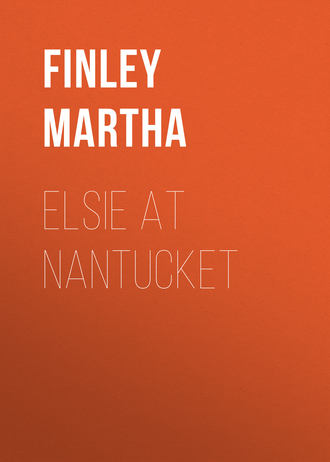 полная версия
полная версияElsie at Nantucket

Martha Finley
Elsie at Nantucket
PREFACE
Three years ago I spent some six weeks on Nantucket Island, making the town of the same name my headquarters, but visiting other points of interest, to which I take the characters of my story; so that in describing the pleasures of a sojourn there during our heated term, I write from experience; though, in addition to my own notes, I have made use of Northrup's "'Sconset Cottage Life" to refresh my memory and assist me in giving a correct idea of the life led by summer visitors who take up their abode for the season in one of those odd little dwellings which form the "original 'Sconset."
Should my account of the delights of Nantucket as a summer resort lead any of my readers to try it for themselves, I trust they will not meet with disappointment or find my picture overdrawn.
M.F.
CHAPTER I
"How happy they,Who from the toil and tumult of their livesSteal to look down where naught but ocean strives."– Byron."Well, captain, for how long have you Uncle Sam's permission to stay on shore this time?" asked Mr. Dinsmore, as the family at Ion sat about the breakfast-table on the morning after Captain Raymond's arrival.
"Just one month certain, sir, with the possibility that the leave of absence may be extended," was the reply, in a cheery tone; "and as I want to make the very most of it, I propose that our plans for a summer outing be at once discussed, decided upon, and carried out."
"I second the motion," said Mr. Dinsmore. "Are all the grown people agreed? The consent of the younger ones may safely be taken for granted," he added, with a smiling glance from one to another.
"I am agreed and ready for suggestions," replied his wife.
"And I," said his daughter.
"Vi is, of course, since the proposition comes from her husband," Edward remarked, with a sportive look at her; then glancing at his own little wife: "and as I approve, Zoe will be equally ready with her consent."
"Have you any suggestion to offer, captain?" asked Mr. Dinsmore.
"I have, sir; and it is that we make the island of Nantucket our summer resort for this year, dividing the time, if you like, between Nantucket Town and the quaint little fishing village Siasconset, or 'Sconset, as they call it for short. There is an odd little box of a cottage there belonging to a friend of mine, a Captain Coffin, which I have partially engaged until the first of September. It wouldn't hold nearly all of us, but we may be able to rent another for the season, or we can pitch a tent or two, and those who prefer it can take rooms, with or without board, at the hotels or boarding-houses. What do you all say?" glancing from his mother-in-law to his wife.
"It sounds very pleasant, captain," Elsie said; "but please tell us more about it; I'm afraid I must acknowledge shameful ignorance of that portion of my native land."
"A very small corner of the same, yet a decidedly interesting one," returned the captain; then went on to give a slight sketch of its geography and history.
"It is about fifteen miles long, and averages four in width. Nantucket Town is a beautiful, quaint old place; has some fine wide streets and handsome residences, a great many narrow lanes running in all directions, and many very odd-looking old houses, some of them inhabited, but not a few empty; for of the ten thousand former residents only about three thousand now remain."
"How does that happen, Levis?" asked Violet, as he paused for a moment.
"It used to be a great seat of the whale-fishery," he answered; "indeed, that was the occupation of the vast majority of the men of the island; but, as I presume you know, the whale-fishery has, for a number of years, been declining, partly owing to the scarcity of whales, partly to the discovery of coal-oil, which has been largely substituted for whale-oil as an illuminant (as has gas also, by the way), and to substitutes being found or invented for whale-bone also.
"So the Nantucketers lost their principal employment, and wandered off to different parts of the country or the world in search of another; and the wharves that once presented a scene full of life and bustle are now lonely and deserted. Property there was wonderfully depreciated for a time, but is rising in value now with the influx of summer visitors. It is becoming quite a popular resort – not sea-side exactly, for there you are right out in the sea."
"Let us go there," said Mrs. Dinsmore; "I think it would be a pleasant variety to get fairly out into the sea for once, instead of merely alongside of it."
"Oh, yes, do let us go!"
"I'm in favor of it!"
"And I!"
"And I!" cried one and another, while Mr. Dinsmore replied, laughingly, to his wife, "Provided you don't find the waves actually rolling over you, I suppose, my dear. Well, the captain's description is very appetizing so far, but let us hear what more he has to say on the subject."
"Haven't I said enough, sir?" returned the captain, with a good-humored smile. "You will doubtless want to find some things out for yourselves when you get there."
"Are there any mountains, papa?" asked little Grace. "I'd like to see some."
"So you shall, daughter," he said; "but we will have to go elsewhere than to Nantucket to find them."
"No hills either?" she asked.
"Yes, several ranges of not very high hills; Saul's Hills are the highest; then there are bluffs south of 'Sconset known as Sunset Heights; indeed, the village itself stands on a bluff high above the sandy beach, where the great waves come rolling in. And there is 'Tom Never's Head.' Also Nantucket Town is on high ground sloping gradually up from the harbor; and just out of the town, to the north-west, are the Cliffs, where you go to find surf-bathing; in the town itself you must be satisfied with still-bathing. An excellent place, by the way, to teach the children how to swim."
"Then you can teach me, Edward," said Zoe; "I'd like to learn."
"I shall be delighted," he returned, gallantly.
"Papa," asked Max, "are there any woods and streams where one may hunt and fish?"
"Hardly anything to be called woods," the captain answered; "trees of any size are few on the island. Except the shade trees in the town, I think some ragged, stunted pines are all you will find; but there are streams and ponds to fish in, to say nothing of the great ocean. There is some hunting, too, for there are plover on the island."
"Well, shall we go and see for ourselves, as the captain advises?" asked
Mr. Dinsmore, addressing the company in general.
Every voice answered in the affirmative, though Elsie, looking doubtfully at Violet, remarked that she feared she was hardly strong enough for so long a journey.
"Ah, that brings me to my second proposition, mother," said Captain Raymond; "that – seeing what a very large company we shall make, especially if we can persuade our friends from Fairview, the Oaks, and the Laurels to accompany us – we charter a yacht and go by sea."
"Oh, captain, what a nice idea!" cried Zoe, clapping her hands. "I love the sea – love to be either beside it or on it."
"I think it would be ever so nice!" Rosie exclaimed. "Oh, grandpa and mamma, do say yes!"
"I shall not oppose it, my dear," Elsie said; "indeed, I think it may perhaps be our best plan. How does it strike you, father?"
"Favorably," he replied, "if we can get the yacht. Do you know of one that might be hired, captain?"
"I do, sir; a very fine one. I have done with it as with the cottage – partially engaged it – feeling pretty sure you would all fall in with my views."
"Captain," cried Zoe, "you're just a splendid man! I know of only one that's more so," with a laughing look at her husband.
The captain bowed his acknowledgments. "As high praise as I could possibly ask, my dear sister. I trust that one may always stand first in your esteem."
"He always will," said Zoe; "but," with another glance, arch and smiling, into Edward's eyes, "don't tell him, lest he should grow conceited and vain."
"Don't tell him, because it would be no news," laughed Edward, gazing with fondness and admiration at the blooming face of the loved flatterer.
The talk went on about the yacht, and before they left the table the captain was empowered to engage her for their use. Also the 'Sconset cottage he had spoken of, and one or two more, if they were to be had.
"You will command the vessel, of course, captain?" several voices said, inquiringly, all speaking at once.
"If chosen commander by a unanimous vote," he said.
"Of course, of course; we'll be only too glad to secure your services," said Mr. Dinsmore, everybody else adding a word of glad assent.
"How soon do we sail, captain?" asked Zoe. "Must we wait for an answer from Nantucket?"
"No; I shall send word by this morning's mail, to Captain Coffin, that we will take his cottage and two others, if he can engage them for us. But there is no time to wait for a reply."
"Can't we telegraph?" asked Violet.
"No; because there is no telegraph from the mainland to the island.
"Now, ladies all, please make your preparations as rapidly as possible. We ought to be off by the first of next week. I can telegraph for the yacht, and she will be ready for us, lying at anchor in our own harbor.
"But, little wife," turning to Violet, with a tenderly affectionate air, "you are not to exert yourself in the least with shopping, sewing, or packing. I positively forbid it," he added, with playful authority.
"That is right, captain," Elsie said, with a pleased smile. "She is not strong enough yet for any such exertion, nor has she any need to make it."
"Ah, mamma," said Violet, "are you not forgetting the lessons you used to give us, your children, on the sin of indolence and self-indulgence?"
"No, daughter; nor those on the duty of doing all in our power for the preservation of health as one of God's good gifts, and to be used in His service."
They were all gathered upon the veranda now in the cool shade of the trees and vines, for the weather was extremely warm.
"I wish we were ready to sail to-day," said Zoe. "How delicious the sea-breeze would be!"
A nice-looking, pleasant-faced colored woman stepped from the doorway with a little bundle in her arms, which she carried to Violet.
The captain, standing beside his wife, bent over her and the babe with a face full of love and delight.
"Isn't she a darling?" whispered Violet, gazing down upon the tiny creature with all a young mother's unspeakable love and pride in her first-born, then up into her husband's face.
"That she is!" he responded; "I never saw a fairer, sweeter babe. I should fear to risk her little life and health in a journey to Nantucket by land; but going by sea will, I think, be more likely to do her good than harm."
"It's all her, her, when you talk about that baby," laughed Rosie; "why don't you call her by her name?"
"So we will, Aunt Rosie, if you will kindly inform us what it is," returned the captain, good-humoredly.
"I, sir!" exclaimed Rosie; "we have all been told again and again that you were to decide upon the name on your arrival; and you've been here – how many hours? – and it seems the poor little dear is nameless yet."
"Apparently not greatly afflicted by it either," said the captain, adopting Rosie's sportive tone. "My love, what do you intend to call your daughter?"
"Whatever her father appoints as her name," returned Vi, laughingly.
"No, no," he said; "you are to name her yourself; you have undoubtedly the best right."
"Thank you; then, if you like, she shall be mamma's namesake; her first granddaughter should be, I think, as the first grandson was papa's."
"I highly approve your choice," he said, with a glance of affectionate admiration directed toward his mother-in-law; "and may a strong resemblance in both looks and character descend to her with the name."
"We will all say amen to that, captain," said Edward.
"Yes, indeed," added Zoe, heartily.
"Thank you both," Elsie said, with a gratified look; "I appreciate the compliment; but if I had the naming of my little granddaughter, she should be another Violet; there is already an Elsie in the family besides myself, you know, and it makes a little confusion to have too many of the same name."
"Then, mamma, we can make a variety by calling this one Else for short," returned Violet, gayly, holding up the babe to receive a caress from its grandmother, who had drawn near, evidently with the purpose of bestowing it.
"What a pretty pet it is!" Elsie said, taking it in her arms and gazing delightedly into the tiny face. "Don't you think so, captain?"
"Of course I do, mother," he said, with a happy laugh. Then, examining its features critically: "I really fancy I see a slight resemblance to you now, which I trust is destined to increase with increasing years. But excuse me, ladies; I must go and write that all-important letter at once, or it will be too late for the mail."
He hurried away to the library, and entering it hastily, but without much noise, for he wore slippers, found Lulu there, leaning moodily out of a window.
She had stolen away from the veranda a moment before, saying to herself, in jealous displeasure, "Such a fuss over that little bit of a thing! I do believe papa is going to care more for it than for any of us, his own children, that he had long before he ever saw Mamma Vi; and it's just too bad."
Knowing Lulu as he did, her father instantly conjectured what was passing in her mind. It grieved and angered him, yet strong affection was mingled with his displeasure, and he silently asked help of God to deal wisely with this child of his love.
He remembered that Lulu was more easily ruled through her affections than in any other way, and as she turned toward him, with a flushed and shamefaced countenance, he went to her, took her in his arms, held her close to his heart, and kissed her tenderly several times.
"My dear, dear little daughter," he said. "How often, when far away on the sea, I have longed to do this – to hold my dear Lulu in my arms and feel hers about my neck and her sweet kisses on my lips."
Her arms were instantly thrown round his neck, while she returned his kisses with interest.
"Papa," she said, "I do love you so, so dearly; but I 'most wonder you don't quit loving such a hateful girl as I am."
"Perhaps I might not love an ill-tempered, jealous child belonging to somebody else," he said, as if half in jest, half in earnest; "but you are my own," drawing her closer and repeating his caresses, "my very own; and so I have to love you in spite of everything. But, my little girl," and his tone grew very grave and sad, "if you do not fight determinately against these wrong feelings you will never know rest or happiness in this world or the next.
"But we won't talk any more about it now; I have no time, as I ought to be writing my letter. Run away and make yourself happy, collecting together such toys and books as you would like to carry with you to Nantucket. Grandma Elsie and Mamma Vi will decide what you and the rest will need in the way of clothing."
"I will, papa; and oh, but I think you are good to me!" she said, giving him a final hug and kiss; "a great deal better than I deserve; but I will try to be good."
"Do, my child," he said; "and not in your own strength; God will help you if you ask Him."
For the moment thoroughly ashamed of her jealousy of the baby, she ran back to the veranda, where the others still were, and bending over it as it lay its mother's arms, kissed it several times.
Violet's face flushed with pleasure. "My dear Lulu, I hope you and little Else are going to be very fond of each other," she said.
"I hope so, Mamma Vi," Lulu answered, pleasantly; then, in a sudden fit of penitence, added, "but I'm afraid she'll never learn any good from the example of her oldest sister."
"My dear child, resolve that she shall," said Grandma Elsie, standing by; "you cannot avoid having a good deal of influence over her as she grows older, and do not forget that you will have to give an account for the use you make of it."
"I suppose that's so," Lulu answered, with a little impatient shrug of her shoulders; "but I wish it wasn't." Then, turning abruptly away, "Max and Gracie," she called to her brother and sister, "papa says we may go and gather up any books and toys we want to take with us."
The three ran off together in high glee. The ladies stayed a little longer, deep in consultation about necessary arrangements which must fall to their share: then dispersed to their several apartments, with the exception of Violet, who, forbidden to exert herself, remained where she was till joined by her husband, when he had finished and despatched his letter. It was great happiness to them to be together after their long separation.
Mr. Dinsmore and Edward had walked out into the avenue, and were seated under a tree in earnest conversation.
"Talking tiresome business, I suppose," remarked Zoe, in a half-petulant tone, glancing toward them as she spoke, and apparently addressing Violet, as she was the only other person on the veranda at the moment.
"Yes, no doubt; but we must have patience with them, dear, because it is very necessary," Violet answered, with a smile. "Probably they are discussing the question how the plantation is to be attended to in their absence. You know it won't take care of itself, and the men must have a head to direct their labors."
"Oh yes, of course; and for that reason Ned is kept ever so busy while we are here, and I do think it will be delightful to get away to the seashore with him, where there will be nothing to do but enjoy ourselves."
Zoe skipped away with the last word, ran up to her room, and began turning over the contents of bureau drawers and taking garments from wardrobes and closets, with the view of selecting such as she might deem it desirable to carry with her on the contemplated trip.
She was humming softly a snatch of lively song, feeling very gay and light-hearted, when, coming across a gray travelling-dress a little worse for the wear, her song suddenly ceased, while tears gathered in her eyes, then began to fall drop by drop as she stood gazing down, upon this relic of former days.
"Just one year ago," she murmured. "Papa, papa! I never thought I could live a whole year without you; and be happy, too! Ah, that seems ungrateful, when you were so, so good to me! But no; I am sure you would rather have me happy; and it would be ungrateful to my dear husband if I were not."
She put the dress aside, wiped away her tears, and took down another. It was a dark woollen dress. She had travelled home in it the previous fall, and had worn it once since on a very memorable occasion; her cheek crimsoned at the recollection as she glanced from it to her husband, who entered the room at that instant; then her eyes fell.
"What is it, love?" he asked, coming quickly toward her.
"Nothing, only – you remember the last time you saw me in this dress? Oh,
Ned, what a fool I was! and how good you were to me!"
He had her in his arms by this time, and she was hiding her blushing face on his breast. "Never mind, my pet," he said, soothing her with caresses; "it is a secret between ourselves, and always shall be, unless you choose to tell it."
"I? No indeed!" she said, drawing a long breath; "I think I should almost die of mortification if any one else should find it out; but I'm glad you know it, because if you didn't my conscience wouldn't give me a bit of peace till I confessed to you."
"Ah! and would that be very difficult?"
"Yes; I don't know how I could ever find courage to make the attempt."
"Are you really so much afraid of me?" he asked, in a slightly aggrieved tone.
"Yes; for I love you so dearly that your displeasure is perfectly unendurable," she replied, lifting her head to gaze fondly into his eyes.
"Ah, is that it, my darling?" he said, in a glow of delight. "I deem myself a happy man in possessing such a treasure as you and your dear love. I can hardly reconcile myself to the thought of a separation for even a few weeks."
"Separation!" she cried, with a start, and in a tone of mingled pain and incredulity. "What can you mean? But I won't be separated from you; I'm your wife, and I claim the right to cling to you always, always!"
"And I would have you do so, if it could be without a sacrifice of your comfort and enjoyment, but – "
"Comfort and enjoyment!" she interrupted; "it is here in your arms or by your side that I find both; nowhere else. But why do you talk so? is anything wrong?"
"Nothing, except that it seems impossible for me to leave the plantation for weeks to come, unless I can get a better substitute than I know of at present."
"Oh, Ned, I am so sorry!" she cried, tears of disappointment springing to her eyes.
"Don't feel too badly about it, little wife," he said, in a cheery tone; "it is just possible the right man may turn up before the yacht sails; and in that case I can go with the rest of you; otherwise I shall hope to join you before your stay at Nantucket is quite over."
"Not my stay; for I won't go one step of the way without you, unless you order me!" she added, sportively, and with a vivid blush; "and I'm not sure that I'll do it even in that case."
"Oh, yes you will," he said, laughingly. "You know you promised to be always good and obedient on condition that I would love you and keep you; and I'm doing both to the very best of my ability."
"But you won't be if you send me away from you. No, no; I have a right to stay with you, and I shall claim it always," she returned, clinging to him as if she feared an immediate separation.
"Foolish child!" he said, with a happy laugh, holding her close; "think what you would lose: the sea voyage in the pleasantest of company – "
"No; the pleasantest company would be left behind if you were," she interrupted.
"Well, very delightful company," he resumed; "then I don't know how many weeks of the oppressive heat here you would have to endure, instead of enjoying the cool, refreshing breezes sweeping over Nantucket. Surely, you cannot give it all up without a sigh?"
"I can't give up the thought of enjoying it all with you without sighing, and crying, too, maybe," she answered, smiling through tears; "but I'd sigh and cry ten times as much if I had to go and leave you behind. No, Mr. Travilla, you needn't indulge the hope of getting rid of me for even a week. I'm determined to stay where you stay, and go only where you go."
"Dreadful fate!" he exclaimed. "Well, little wife, I shall do my best to avert the threatened disappointment of your hopes of a speedy departure out of this heated atmosphere and a delightful sea voyage to that famous island. Now, I must leave you and begin at once my search for a substitute as manager of the plantation."
"Oh, I do hope you will succeed!" she said. "Shall I go on with my packing?"
"Just as you please, my dear; perhaps it would be best; as otherwise you may be hurried with it if we are able to go with the others."
"Then I shall; and I'm determined not to look for disappointment," she said, in a lively, cheery tone, as he left the room,
At the conclusion of his conference with Edward, Mr. Dinsmore sought his daughter in her own apartments. He found her busied much as Zoe was, looking over clothing and selecting what ought to be packed in the trunks a man-servant was bringing in.
She had thrown aside the widow's weeds in which she was wont to array herself when about to leave the seclusion of her own rooms, and donned a simple white morning dress that was very becoming, her father thought.
"Excuse my wrapper, papa," she said, turning toward him a bright, sweet face, as he entered; "I found my black dress oppressive this warm morning."
"Yes," he said; "it is a most unwholesome dress, I think; and for that reason and several others I should be extremely glad if you would give it up entirely."
"Would you, my dear father?" she returned, tears springing to her eyes.
"I should indeed, if it would not involve too great a sacrifice of feeling on your part. I have always thought white the most suitable and becoming dress for you in the summer season, and so did your husband."









